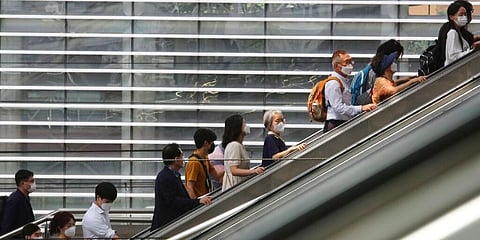COVID-19: South Korea reports 266 fresh cases, masks made mandatory in Seoul
SEOUL: South Korea counted its 11th straight day of triple-digit daily jumps in coronavirus cases Monday and health officials pleaded for people to follow guidelines or risk further restrictions or strains on hospitals.
Most of the 266 new cases reported by the Korea Centers for Disease Control and Prevention were in the Seoul metropolitan area, home to half of the country’s 51 million people, but new infections were also reported in other major cities, including Busan, Daejeon and Sejong.
KCDC director Jeong Eun-kyeong said it’s likely the country will continue to report huge infection numbers in coming days as health workers scramble to trace and test contacts of virus carriers.
She pleaded people to stay home unless for essential reasons, wear masks if they do, and maintain distance between other individuals so that “students could continue to learn, small merchants could continue to do business and to prevent the medical system from collapsing.”
The 397 new cases reported on Sunday was South Korea's highest single-day total since March 7, during an outbreak that was largely limited to its southeastern region and was stabilized by April. Officials consider the current outbreak South Korea’s biggest crisis since the emergence of COVID-19, given the population density of the capital region and the spread of the virus among more varied sources.
The country since Sunday has banned larger gatherings, shut down nightspots and churches and removed fans from professional sports nationwide.
Seoul, Sejong and the island province of Jeju began requiring people to wear masks in public Monday but enforcement was unclear. Seoul's existing mandate for wearing masks on mass transport has been dependent on bus drivers and subway station workers.
The country is also working to prevent hospital systems in the capital area from being overwhelmed, such as adding more temporary shelters to treat mild cases while saving hospital beds for patients who are more seriously ill. The six current shelters — including one built at a Seoul training center for Olympic athletes — could accommodate some 1,400 people, but officials are hoping to increase the capacity to 4,000, senior Health Ministry official Yoon Taeho said.
Jeong and other officials said the country could be forced to elevate social distancing restrictions if the virus doesn’t slow after this week. That could possibly mean banning of gatherings of more than 10 people, shutting schools, halting professional sports and recommending private companies' employees work from home, measures that would batter an already weak economy.
Churches had been a major source of infections before authorities shut them down. As of Monday afternoon, 875 infections were linked to a northern Seoul church whose pastor led a march of thousands of anti-government protesters earlier this month.
Jeong said 176 infections have been linked to the protests so far, including seven among police officers who were deployed to watch demonstrators. The pastor, who shared a microphone with other activists on stage during the rally, has been hospitalized a week with COVID-19.

